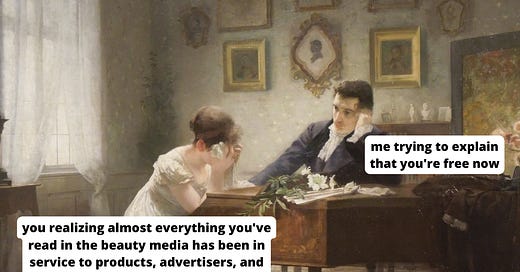Skincare as Extractive Capitalism (New Podcast!)
Listen to my episode of The Waves, Slate's gender and feminism podcast.
Put down the Biologique Recherche Lotion P50 and pull up your podcast app — today, I’m a guest on Slate’s gender and feminism podcast The Waves! In “Why You Need to Downsize Your Skin-Care Routine,” senior editor Shannon Palus and I discuss my much-debated Slate article, Your Skin Doesn’t Need Skincare, plus celebrity skincare lines (barf), vibrating facial massagers (a surprising solve for jaw tension), and the “science of skincare” (AKA, the “science of product sales”).
Some highlights from the episode:
On skincare as extractive capitalism:
The basis of basically any product on the market is rooted in, What does the skin already do? And how can we outsource this function to a product to make money? Even as far as the ingredients that are marketed. Some of the trendiest ingredients right now — ceramides, peptides, hyaluronic acid, collagen, probiotics, prebiotics — your body produces all of these things naturally. Your skin has them naturally. I sort of think of it as a form of extractive capitalism, because it’s this industry coming in saying, Oh wow, look at what the skin can do. Let’s find a way to take this away, put it in a bottle, and sell it back. And in the process, it devalues how incredible the skin is on its own. It makes people think, Oh, my skin is lacking. I need this external product — when really, your skin is producing it anyway.
On addressing acne without products:
The skin is a communication device — that’s one of its jobs. Like, the skin doesn’t exist to look perfect and pretty and dewy. The skin exists to regulate your functions and keep you alive. It’s part of your immune system. So if you have acne, it’s a communication that something is imbalanced elsewhere, whether that’s your external environment or your internal environment. And it’s trying to point you toward what is actually happening, so you can find the root issue and address it. And [topical] products will never be that.
On the collective obsession with skincare being “silly”:
I don’t think it’s silly at all. I think it’s really serious. Through years of researching the skin and beauty standards — which are why we do all the things we do to our skin — I have come to understand just how harmful our beauty behaviors can be, not just in terms of skin health, but in terms of mental health. A lot of times skincare is messaged as self-care, as a tool for confidence and self-esteem, but the data bears out a very different story. This all-encompassing focus on our physical appearance and manipulating it contributes to anxiety, depression, body dysmorphia, facial dysmorphia, eating disorders, appearance obsession, addiction to cosmetic procedures, self-harming, and even suicide. So it’s not that these beauty behaviors are all fun and self-care and self-expression. A lot of times, they have a much deeper impact on us psychologically, and that is really what I’m interested in sort of addressing and correcting.
On not paying attention to trends:
I don’t pay attention to new ingredients or trends anymore. If you focus on the foundational information of how your skin actually functions, you don’t have to, because that doesn’t change. The trends change, but how your skin works doesn’t. And that information will always serve you, so you can sort of just absorb that basic information and chill and not have to worry about skincare ever again.
On skincare as a search for goodness:
Beauty has been messaged as an ethical ideal, as a moral imperative for thousands and thousands of years, even with phrases like “good skin” and “bad skin.” Those words really do seep into your subconscious and affect why you do what you do. So our quest for beauty, our quest for perfection, is actually a quest for goodness.
On the “science” of skincare as a marketing movement:
It’s sort of like a surface-level rejection of “beauty” and what beauty has traditionally meant — almost a feminist thing. Like, “I’m rejecting frivolous beauty and I’m embracing logic and rationale and science and health.” When really, it’s still just a bunch of beauty standards.
Slate Plus members can also hear our bonus segment: Is Bar Soap Feminist? (Lol.) You can probably guess what I have to say about that, but the discussion is fun nonetheless!





I need to hear what you think of bar soap! Also, love this meme so much